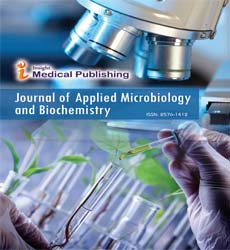ISSN : ISSN: 2576-1412
Journal of Applied Microbiology and Biochemistry
Challenges and Opportunities in Industrial Microbiology: A Global Perspective
Nick Jo*
Department of Microbiology, University of Cagliari, Cagliari, Italy
- *Corresponding Author:
- Nick Jo
Department of Microbiology, University of Cagliari, Cagliari,
Italy,
E-mail: jonick@yahoo.com
Received date: May 14, 2024, Manuscript No. IPJAMB-24-19278; Editor assigned date: May 17, 2024, PreQC No. IPJAMB-24-19278 (PQ); Reviewed date: May 31, 2024, QC No. IPJAMB-24-19278; Revised date: June 07, 2024, Manuscript No. IPJAMB-24-19278 (R); Published date: June 14, 2024, DOI: 10.36648/2576-1412.8.3.229
Citation: Jo N (2024) Challenges and Opportunities in Industrial Microbiology A Global Perspective. J Appl Microbiol Biochem Vol. 8 No.3:229.
Description
Industrial microbiology encompasses the utilization of microorganisms in large-scale fermentation processes to produce valuable products. Fermentation involves the metabolic conversion of substrates by microorganisms such as bacteria, yeast, or fungi into products like ethanol, lactic acid, enzymes, antibiotics, and more. Key aspects of industrial fermentation include selecting and optimizing microbial strains, controlling fermentation conditions in bioreactors, and maximizing product yields while ensuring efficiency and cost-effectiveness. Advances in bioprocess engineering have led to the development of sophisticated bioreactor systems capable of precise control over parameters like temperature, pH, oxygen levels, and nutrient supply, vital fo r microbial growth and product formation. Industrial microbiology and fermentation play pivotal roles in diverse industries by harnessing the metabolic capabilities of microorganisms to produce valuable products sustainably. From food and drugs to environmentally friendly power and biotechnology, the utilizations of aging keep on extending. As technological advancements and scientific knowledge progress, the potential for microbial fermentation to meet global challenges and drive innovation remains promising.
Industrial fermentation
Industrial microbiology plays a crucial role in fermentation processes, where microorganisms are harnessed to produce valuable products through controlled biochemical reactions. This field integrates microbiology, biochemistry, and engineering principles to optimize the growth and metabolic activities of microorganisms for industrial-scale production. Fermentation, a cornerstone of industrial microbiology, involves the conversion of substrates into desired products using microbial catalysts under controlled conditions. Industrial microbiologists continually revolution to enhance fermentation processes, exploring genetic engineering to tailor microbial strains for specific applications and integrating sustainable practices to minimize environmental impact.
The future of industrial fermentation grasp promise in meeting global challenges through sustainable production of food ingredients, pharmaceuticals, renewable fuels, and biochemical, driven by ongoing research and technological advancements. Fermentation is a metabolic process where microorganisms such as bacteria, yeast, or fungi convert organic compounds-often sugars or starches-into alcohol, acids, gases, or other biochemicals. This process has been harnessed by humans for millennia in various applications, including food and beverage production, pharmaceuticals, biofuels, and more recently, in the production of bioplastics and biochemicals. Different microorganisms are employed based on the desired product.
Yeasts like Saccharomyces cerevisiae are commonly used in brewing and baking industries for alcohol and bread production, respectively. Lactic acid bacteria such as Lactobacillus species are utilized in the dairy industry for yogurt and cheese fermentation. Industrial microbiologists select strains based on their metabolic capabilities, substrate specificity, and environmental robustness. Industrial fermentation requires precise control of environmental factors such as temperature, pH, oxygen levels, and nutrient availability to optimize microbial growth and product formation. Bioreactors are essential tools where these conditions are carefully monitored and adjusted. Advances in bioprocess engineering have led to the development of scalable fermentation technologies capable of producing high yields of products economically and sustainably.
Applications of industrial fermentation
In food production, fermentation enhances flavor, texture, and nutritional value. Beyond traditional applications in brewing and dairy, fermentation is utilized in the production of fermented vegetables, soy sauce, and fermented meats, among others. Microbial fermentation is integral to the production of antibiotics, vaccines, and therapeutic proteins such as insulin. Advances in genetic engineering have enabled the modification of microbial strains to produce complex pharmaceutical compounds efficiently. The quest for sustainable energy sources has driven research into biofuels like ethanol and biodiesel, which can be produced through microbial fermentation of biomass.
Industrial microbiology also explores the production of bioplastics and biochemicals as alternatives to petroleumderived materials. Despite its successes, industrial fermentation faces challenges such as substrate availability, product purification, and waste management. Researchers are investigating new microbial strains, optimizing fermentation conditions, and integrating biotechnological approaches to address these challenges. Future trends include the use of synthetic biology for designing microorganisms with tailored metabolic pathways and the application of fermentation in environmental remediation. Industrial microbiology's integration with fermentation processes exemplifies the synergy between biology, chemistry, and engineering, offering solutions to societal needs while advancing our understanding of microbial life and its applications in industry.
Open Access Journals
- Aquaculture & Veterinary Science
- Chemistry & Chemical Sciences
- Clinical Sciences
- Engineering
- General Science
- Genetics & Molecular Biology
- Health Care & Nursing
- Immunology & Microbiology
- Materials Science
- Mathematics & Physics
- Medical Sciences
- Neurology & Psychiatry
- Oncology & Cancer Science
- Pharmaceutical Sciences
